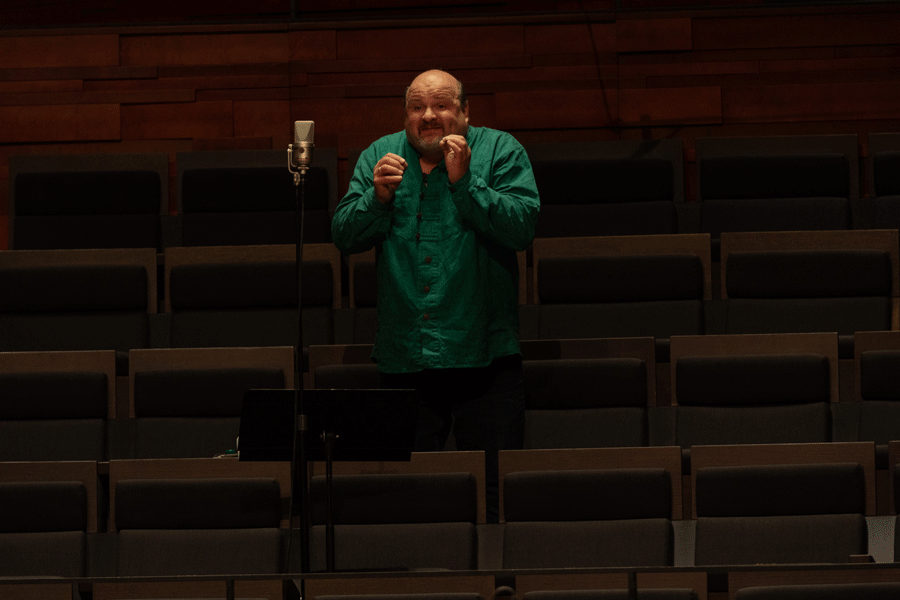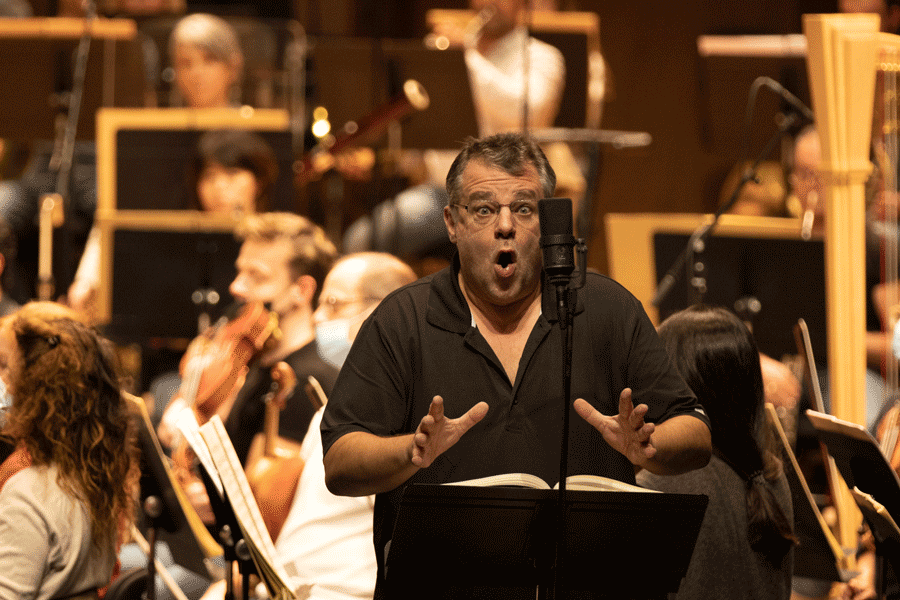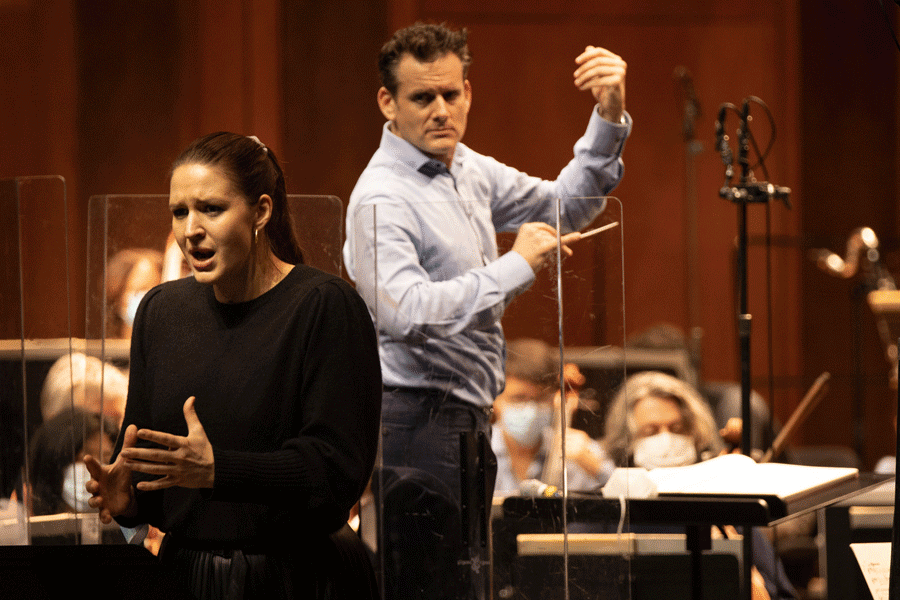Alas, where now is that contempt for fate ?
Where is that heart fit for adversity,
That honest craving for immortality,
And that fine flame that scorned the second rate ?
-
Where are those sweet joys of darkness late
The Muses gave me, when at liberty,
On some far shore’s sweet verdant tapestry,
I’d lead their dance, and moonlight celebrate ?
-
Destiny and fate’s my mistress now,
My heart, her master, to which she would bow,
Is slave to a thousand dull regrets instead.
-
I give no thought now to posterity,
That divine ardour, is long gone from me,
And the Muses, like strangers, now are fled.
-
Joachim Du Bellay, Les Regrets, 6
"It's a miracle!”
"It's a miracle!": such was Philippe Jordan’s heartfelt cry of relief, expressing an understandable pride, in his AFP statement, and it says a lot about the emotional burden that the recording of the complete Ring by Wagner represents for him and the Paris Opera. It marks the end of his mandate as Music Director, more than 10 years after taking the lead of the Orchestra and launching the adventure with another Ring. Everything was planned so that Calixto Bieito's long-awaited new production of the work could mark the apotheosis of Stéphane Lissner's mandate as head of the Opera and Philippe Jordan's as head of the Orchestra. It was also meant to be the culmination of a long Wagnerian journey for both the Orchestra and Jordan. The exploration of the Wagnerian corpus has been one of the core elements of the collaboration between the conductor and a phalanx whose musicians were playing the Ring for the first time upon his arrival. Not only did Wagner mark the Parisian seasons of the Jordan era, which, after this first Ring, brought on stage Tristan und Isolde, Die Meistersinger von Nürnberg, Lohengrin or Parsifal, but Jordan also considerably strengthened his own Wagnerian experience during this period, guesting in particular in the three most sacred temples of Wagnerism : the Bayreuth Festspielhaus (Parsifal in 2012 and Die Meistersinger von Nürnberg between 2017 and 2019), the BayerischeStaatsoper (Tristan und Isolde, for the 150th anniversary of the creation of the work, in situ, and a farewell to Isolde by the great Waltraud Meier!) and the Metropolitan Opera (for the last revival of the Ring directed by Robert Lepage in 2019). It was therefore time to fully measure whether Paris had become a reference theatre for Wagner. Alas, the arrival of the COVID-19 crisis, the early and turbulent withdrawal of Stéphane Lissner, the evolutions of public policy in terms of transport, the orders and counter-orders around health constraints, the management of contact cases (including Philippe Jordan!) or the increased difficulties of comings and goings of international artists could have totally overwhelmed the project. From a new staging, to a concert version with an audience, a concert version without an audience broadcast live or, finally, a recording broadcast on a delayed basis, all formats have been considered.
As recording sessions came to an end on December 6th, another "miracle" was kicking off : the forces of the Mariinsky Theatre, led by Valery Gergiev, offered their annual Ring the following week, fully staged, and in front of an audience that was socially distanced but strongly applauded the artists night after night. This is a striking example of the contrasts in popular and governmental responses to cultural matters in a covidated world. 2020 was supposed to be a permanent festival for Wagner lovers ; unfortunately, the Rings scheduled in Vienna, Chemnitz, Chicago, Oldenburg, Brisbane, and Paris, have aborted, just as the Tannhäuser of the Rouen Opera, the first Wagnerian "victim" fallen in the context of the war against the Virus. The Deutsche Oper Berlin was able to launch its new Ring in September, under the leadership of star director Stefan Herheim, in front of an audience, with a magnificent Walküre (Wanderer was there : https://wanderer.legalsphere.ch/2020/10/trop-didees-tuent-lidee/), this is one of the rare staged productions which survived in a landscape where it takes a hard struggle to maintain one’s optimism. Institutions and audiences are now reduced to finding new marks in an environment led by recordings of shows, often live or slightly delayed, Wagner not escaping the rule. This is how the Berlin Staatsoper was able to complete the preparation of its Lohengrin, an event staged by Calixto Bieito a few days ago. ((Wanderer couldn't miss it : https://wanderer.legalsphere.ch/2020/12/la-fabrique-de-lidentite/, Lohengrin staged by Calixto Bieito broadcast on 13 December 2020 and available until 12 January 2021 online at Arte Concert : https://www.arte.tv/fr/videos/099744–001‑A/roberto-alagna-et-vida-mikneviciute-dans-lohengrin/. Numerous initiatives to broadcast (non-Wagnerian) shows are of course developing, such as La Dame blanche, broadcast live from the Rennes Opera and available on YouTube (https://www.youtube.com/watch?v=tDC0Avj6uWs) or Die Tote Stadt created live from Cologne and regularly available on the platform of this house (https://www.oper.koeln/de/programm/die-tote-stadt/5222) .))

Abandon all hope, ye who enter here : there would be neither staging, nor video broadcast. What's the point of saving Private Ring at this price, isn't it tantamount to immolating it on the altar of Wagnerian heresy ? Indeed, let us remember that The Ring of the Nibelung is a form of manifesto par excellence of one who bore the ambition to lay the foundations of a total work of art (the famous Gesamtkunstwerk concept), based on a symbiosis of all the arts, magnified and magnified by music. Does it make sense to deprive this "stage festival" of sets (and architecture), of theatre (and staging)?
Beyond the question of meaning, there remains the event itself, which is remarkable these days : 14 hours of music, 34 characters, a spectacular orchestra (the two orchestras of the Paris Opera were required), massive choirs… It took the narcissistic obstinacy of The-One-Who-Wanted-His-Second-Ring and the unfailing therapeutico-logistical relentlessness of the House staff to save the possibility of this recording, undoubtedly miraculous. So Dante Jordan did not have to abandon all hope, finally !
What's the point, for a discreet amateur, alone in the huge house for these recording sessions, of "reporting" observations that will undoubtedly find little echo in the France Musique broadcast ? First factor : as far as conditions are concerned, the entire organisation is naturally designed to optimise the quality of the recording, as well as to preserve a now proverbial social distance. In Bastille, the Walkyries in Die Walküre or the choir in Götterdämmerung are thus placed in the first rows of the stalls, turning their backs to the (absent) audience, and sing facing the orchestra, which plays on stage in the famous wooden conch dedicated to concerts at the Opera. So what can I report about that ? At the Maison de Radio-France, whose cramped auditorium is a major obstacle to the deployment of Siegfried's luxuriant sound, the singers are placed at the back of the orchestra ; the mass forms a wall of sound that even Andreas Schager, one of the most voluminous voices on the market, struggles to break, for example in the scene at the forge – Minister Roselyne Bachelot, who was attending this session, was also amused by the incongruity of capturing such a work at Radio-France ; it would have been much more natural to record it on the spot at Bastille, like the rest of the operas ((Please see the exchanges with the sound engineers that RoselyneBachelot posted on her Instagram account : https://www. instagram.com/p/CIdc_IqqqBf/.)). So what can I say ? Second and corollary factor : when it comes to the listening conditions, the raw material we heard in the auditorium was bound to be manipulated by the fairy hands of Radio-France's artistic and technical teams with a view to broadcasting. So what can be said, then, that is not a travesty of the work of the artists in the auditorium or a betrayal of what the listener will hear at home ? The relevance of ”reviewing” such a performance under these conditions would be questionable to say the least.
Nevertheless, a few key points emerge from Philippe Jordan's approach.

A miraculous project leading to a miracle result ?
A very alluring direction at first, striking from the first act of Die Walküre, the first work which was recorded, conducted in 58 minutes – less than Pierre Boulez in Bayreuth. With 2h16, it is an unusually blithe Rheingold that it is offered to us ((Without reaching the extreme of James Levine's 2h43 at the Met in 1990, the typical length ranges between 2h25 and 2h30 in average.)) Act I of Götterdämmerung echoes the speed of Bayreuth’s Joseph Keilberth in the 1950s. Beyond a somewhat vain chronometric fetishism, one notes that this rhythm deploys more tension and scansion in the action ; it is not just a matter of speed and leading his forces with drums beating, Jordan knocks down the scenes and inspires his musicians with a staggering commitment in the musical flow carrying the drama.
How ? By coupling this drive with a remarkable scalpel work on the dynamics ; the whole spectrum is exploited from the almost imperceptible original flow of the Rhine to the tumult and rage that mark the adventure. Even more than in the 2013 cycle, Jordan resorts to those frozen silences for which he had been accused of useless effects. In any case, we are far from the "tepid sound mash" denounced by Pierre Boulez some decades ago. It must be said that the orchestra remains in a state of grace throughout the cycle. Even a few isolated incongruities ((For example, a bass clarinet is particularly grotesque in its failed starts, soapy strokes, approximate interventions.)) cannot overshadow the pleasure given (and obviously taken) by the musicians of an orchestra which is often suspected of doing only what it wants. The many symphonic passages in the cycle are opportunities to experience the sumptuous timbres of an ensemble that responds to the physical intensity of the conductor's ever-clear investment. Throughout this marathon, the musicians' attention to their conductor was clearly marked, and Götterdämmerung and Siegfried allowed Philippe Jordan to tell the two orchestras how proud he was of the work accomplished with a phalanx which he leaves at the top of their form. What we heard reinforces this feeling : at this level of commitment, never mind the bottle, let's just drink it, musical Heaven is guaranteed. Everything is there so that the next musical director can approach the next Wagner on an ideal basis.

34 roles, as said… and for this eventful Ring, Stéphane Lissner had assembled a balanced and highly starred line-up, at least on the scale of the Wagnerian microcosm. COVID-19, a surprise guest, undoubtedly gave the artistic team multiple cold sweats ; there were early replacements (the re-formation of the couple Siegmund Jonas Kaufmann / Sieglinde Eva Maria Westbroek, memorable twins at the MET 7 years ago, did not take place in the end), there were last-minute replacements (is there a Helmwige in the Theatre ? Chance had it that Ricarda Merbeth was then rehearsing in Bastille, and she came to the rescue, following the unplanned defection of the singer that very afternoon), but it is difficult to find better than what was offered to us given the circumstances.
We meet again some veterans of the Ring, more than ever at the top of their Art. Let us retain among them Gerhard Siegel, the Mime of the decade or even more, who knows as no one else how to constantly embody the dismaying and touching cowardice of his character. Jochen Schmeckenbecher gives him a fraternal reply, an Alberich with icy prosody, chiselled diction, and a very dark characterisation. Another great Wagnerian singer of our time is Andreas Schager, untouchable in the title-part of Siegfried : if the Radio-France auditorium did not give us the opportunity to be as struck as we should have been, his valorous and feverish performance in Götterdämmerung continues to gain in subtlety and nuance over the seasons. Ekaterina Gubanova's Fricka also deserves all the praise, with so much drama in her voice too – in this strongly Wagnerian moment of her career, since she made her Ortrud debut a few days later in the Berlin Lohengrin mentioned above.
Part of the 2010–2013 Paris Ring team is back on the same stage in 2020. Concert version or not, Günther Groissbock, already Fafner and Hunding in 2010–2013, brings out all the necessary drama with his brilliant and inhabited singing alone, maybe a bit restrained by the concert format. One can only start to imagine what he could have deliver as Wotan, this time devolved to Iain Paterson (Fasolt and Gunther of the previous edition). The three Wotan/Wanderer roles have little in common and Paterson was not equally convincing on those three nights. He undoubtedly belongs more to the category of storytelling Wotans, with particular attention paid to the text, than to that of the Wotans who impress by their sound impact and charisma ; great interest will be taken in the restitution that will be made on the France Musique broadcast of a very nuanced and precise performance, perhaps not as striking as expected.

The two Sieglinde from 2010–2013, Martina Serafin and Ricarda Merbeth, bring their experience to the overwhelming role of Brünnhilde. The former’s confident singing in The Walkyrie, sometimes a rigid strand where valour would call for more letting go, allows her many contrasts, exploring intimate voluptuousness and martial registers with equal conviction. The latter, after a furtive last-minute intervention in Helmwige, throws herself headlong into the Brünnhilde of Siegfried and Götterdämmerung ; her physically impressive investment and her constant concern for vocal balance are reflected in performances that are more designed for the microphones than for an empty room, a work that radio broadcasting will allow us to appreciate to its fullest extent. But it is a newcomer who has left its mark on the female cast : Lise Davidsen replaced Eva Maria Westbroek, initially announced in Sieglinde. She had debuted in the role a few weeks earlier at the Deutsche Oper in Berlin, alongside Nina Stemme, the Brünnhilde of the moment. We were there and were literally blown away by her decibels, paradoxically so well mastered, with fleshy harmonics ; a punchy performance, an impetuous incarnation that carried away some reservations of detail in terms of diction and sometimes accuracy. A few weeks apart, the shock is fully renewed, but the concert format imposes an almost too cautious attention to the text and perhaps somewhat restricts the full deployment of an exceptionally promising instrument. It is a stunning performance, ideally accompanied in Act I by Stuart Skelton's Siegmund, whose dynamic nuances and alternately percussive and delicate vocals delight.
In the portrait gallery of the Ring, secondary roles are never “non-essential”, as we are reminded by such strong personalities as Johannes Martin Kränzle, whose Gunther is a fine speaker as much he has a flattering timbre, and Ain Anger as Hagen, whose depth and power of the so emblematic calls to vassals (Act III, scene 2 of Götterdämmerung) are convincing. The care given to the rest of the very balanced cast guarantees many good surprises and a permanent listening pleasure, Philippe Jordan proving always very concerned about the balance between voice and orchestra. Wouldn't the vibrant commitment of the troupe and the musicians revive a little of this theatre sacrificed by the absence of staging ?
It is now up to the reader to forge his own opinion by listening to France Musique for at least a few hours ((As a reminder, the recording, broadcast on France Musique from 26 December 2020 to 2 January 2021, will be available on demand during one month )) let's bet that the present necessarily synthetic overview will not spoil any of the pleasure our readers will take from listening to this special Ring opus by opus, before – who knows ? – its most welcome discographic release !
Recording of this Ring available on demand until January 31 on France-Musique website :
Das Rheingold :
https://www.francemusique.fr/emissions/samedi-a-l-opera/le-ring-de-wagner-diffusion-inedite-l-or-du-rhin-prologue-90141
Die Walküre :
https://www.francemusique.fr/emissions/le-concert-de-20h/direct-opera-bastille-la-walkyrie-de-wagner-par-l-orchestre-de-l-opera-de-paris-avec-philippe-jordan-90379
Siegfried :
https://www.francemusique.fr/emissions/le-concert-de-20h/la-tetralogie-de-richard-wagner-version-concert-deuxieme-journee-siegfried-90498
Götterdämmerung :
https://www.francemusique.fr/emissions/samedi-a-l-opera/la-tetralogie-de-richard-wagner-version-concert-troisieme-journee-le-crepuscule-des-dieux-90342
